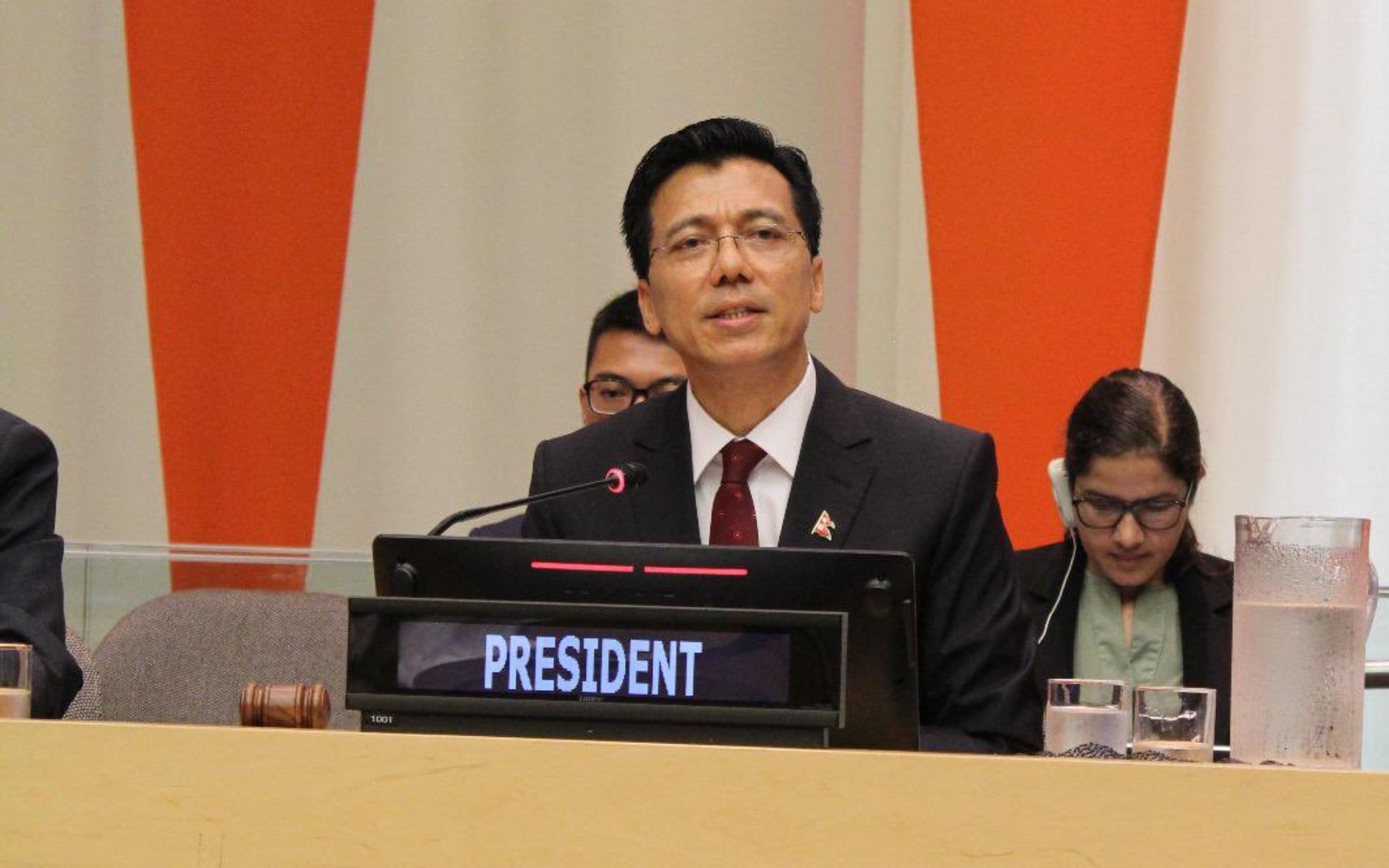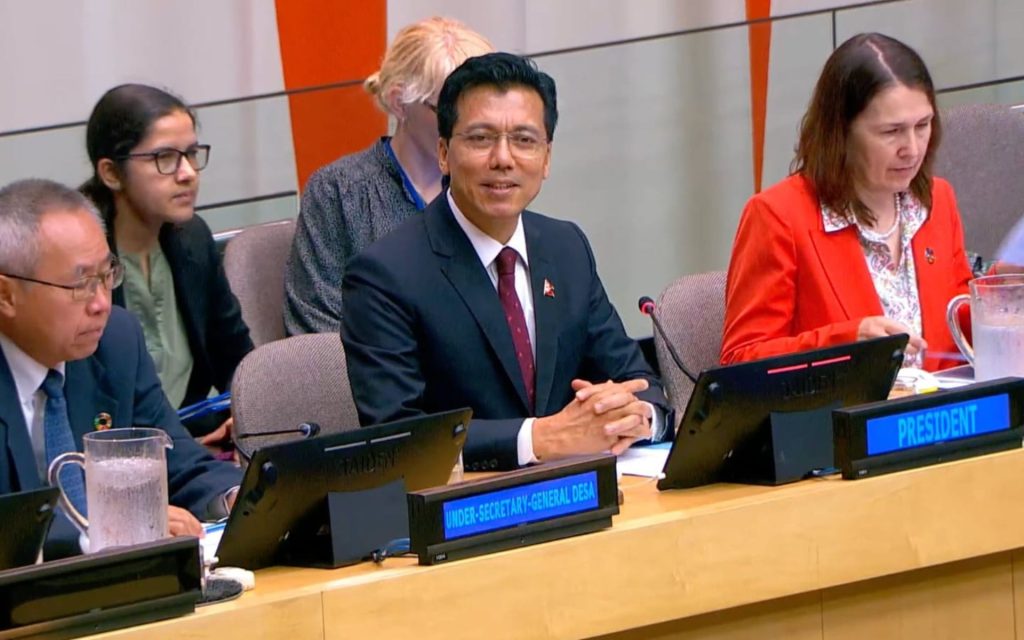

 18.49°C काठमाडौं
18.49°C काठमाडौं

It is a distinct honour and privilege for me to assume the Presidency of the Economic and Social Council for its 2025-2026 Session. I extend my sincere gratitude and appreciation to all Member States for the trust and confidence placed in Nepal for this pivotal role.
I accept this responsibility with humility, resolve, and deep commitment to advancing ECOSOC’s vital role in shaping inclusive, coordinated, and results-driven solutions to the world’s most pressing development and humanitarian challenges. Let me begin by expressing our heartfelt gratitude to the outgoing President, His Excellency Mr. Bob Rae, and his dedicated team. His visionary leadership and principled diplomacy elevated ECOSOC’s voice and relevance. He led the Council with clarity, conviction, and compassion-qualities that will continue to inspire us.
I am committed to building on this foundation with continuity and purpose, to further enhance ECOSOC’s agility, coherence, and impact. I also thank the outgoing Bureau members – H. E. Mr. Anatolio Ndong Mba, Permanent Representative of Equatorial Guinne, H. E. Mr. Krzysztof Szczerski, Permanent Representative of Poland, and Her Excellency Ms Maritza Chan, Permanent Representative of Costa Rica for their dedication and contributions over the past year.
I wish to congratulate and warmly welcome the incoming Bureau members: His Excellency Mr. Amar Bendjama, Permanent Representative of Algeria; His Excellency Mr. Héctor Gómez Hernández, Permanent Representative of Spain; His Excellency Mr. Wellington Bencosme Castanos, Permanent Representative of the Dominican Republic, and His Excellency Mr. Paruyr Hovhannisyan, Permanent Representative of Armenia. I look forward to working in close partnership with each of them as we advance our shared vision for inclusive, effective, and results-driven Council the year ahead.

Historic Moment for Nepal in 70 years
For Nepal, this is a historic moment. This year marks seventy years since our admission to the United Nations- a journey of transformation from a newly admitted member to a steadfast advocate of peace, security, development, and human rights. Assuming the ECOSOC Presidency for the first time is a testament to our enduring commitment to multilateralism and our aspiration to contribute meaningfully to build trust, strengthen multilateral cooperation, and achieve a more just, inclusive, equitable, and resilient world.
The world today is navigating a polycrisis-conflict, climate disruption, economic uncertainty, and deepening inequalities. Geopolitical tensions and renewed Great Power Competition threaten multilateralism. Cyber threats are escalating, while generative AI presents both promise and peril. Despite digital progress, billions remain offline, especially in countries in special situations.
The 2030 Agenda is seriously off-track-only 17% of SDG targets are progressing. Poverty, hunger, and inequality persist. Humanitarian needs have surged, with nearly 300 million people requiring urgent assistance. A $4 trillion annual financing gap for developing countries threatens progress on both SDGs and climate goals. These challenges are systemic and interconnected.
They demand integrated, inclusive, and forward-looking responses. In this context, the role of ECOSOC has never been more relevant and important. Indeed, ECOSOC’s convening power is indispensable-for restoring trust in multilateralism and driving coherent, collective action in our shared interests.
This session coincides with ECOSOC’s 8oth anniversary and the broader UN80 Initiative. The mandated review of ECOSOC, the High-Level Political Forum, and their subsidiary bodies offers a timely opportunity to enhance coherence, streamline mandates, reduce fragmentation, and reinforce ECOSOC’s role for inclusive, results-driven multilateralism. This will complement the UN Secretary-General’s UN80 Initiative.
Strengthening ECOSOC must be our strategic priority not only as a platform for dialogue, but as a catalyst for delivery. It is also a moment to reaffirm its centrality in shaping development agenda that leaves no one behind and builds a better future for all. The theme for ECOSOC’s 2025-2026 session i.e. “Transformative, equitable, innovative and coordinated actions for the 2030 Agenda and its SDGs for a sustainable future for all” is a clarion call for action with urgency.
Next year’s High-Level Political Forum will conduct in-depth reviews of Goals 6, 7, 9, 11, and 17. These goals are critical pillars for sustainable development. Under this overarching theme, Nepal’s Presidency will be guided by the motto: “Delivering Better.” Delivering better is not an option-it is an imperative. It is our pathway to restoring trust in multilateralism, bridging divides, empowering the most vulnerable, and translating commitments into action. It is how we make the SDGs real-for every person, in every place.
Delivering Better
Let me highlight what “Delivering Better” means for us. First, strengthening multilateralism and rebuilding trustamong nations, and between institutions and the people they serve: In the face of today’s interconnected crises-from inequality and conflict to climate change and digital disruption-there is no alternative to multilateral cooperation. It remains our most powerful tool to deliver shared solutions and lasting progress. We have shown that multilateralism can deliver better including through the recent multilateral processes-in Sevilla, in Nice and others. During our Presidency, we will be working harder to rebuild trust and strengthen inclusive multilateral cooperation.
Second, accelerating the 2030 Agenda: With time running out, we must fast-track SDG implementation. This requires scaled-up investment, bold policies, innovation, and inclusive partnerships-especially for the most vulnerable and underserved. I will work with member states and UN agencies how we can accelerate the 2030 Agenda for Sustainable Development and contribute to its effective implementation.
Third, ensuring effective coordination and coherence within the UN System: A unified UN system is key to delivering better results. We will promote effective coordination and coherence across ECOSOC’s bodies, streamline processes, and foster agility, inclusivity, and accountability so that we can deliver better outcomes on the ground.
Fourth, strengthening partnerships: Creating greater synergy among the UN’s principal organs is critical to ensuring a coherent and coordinated global response to today’s multidimensional challenges. I will work closely with the President of the General Assembly, the President of the Security Council and UN Secretary General. We will also engage all stakeholders-civil society, private sector, youth, academia, women, indigenous peoples, persons with disabilities, and those furthest behind.
Five, ensuring implementation and follow-up: Ambition must lead to action. ECOSOC must evolve from convening dialogue to driving measurable impact, ensuring follow-up on major UN
conferences and realization of summits’ declarations and decisions into real progress. This also help build trust and strengthen multilateral cooperation.
Five Priority Areas During Presidency
During Nepal’s ECOSOC presidency, we will place special emphasis on five priority areas that, I believe, respond to today’s global challenges and unlock transformative opportunities.
First, we will focus on transforming agriculture and food systems to strengthen food security and rural resilience. As over 735 million people face hunger globally and with food prices volatile and rural livelihoods under threat, ECOSOC must drive coordinated investment, inclusive innovation, and policy reforms. We will spotlight these issues across ECOSOC’s platforms, building on the UN Food Systems Summit Stocktake (UNFSS+4), and promote agrifood systems as engines of equity, sustainability, and opportunity.
Second, we will champion digital inclusion and youth entrepreneurship to accelerate SDG progress. Many developing countries are experiencing a significant youth bulge – a powerful demographic asset. We must make every effort to translate this untapped potential into inclusive growth and innovation- through education, decent work, digital skills, and entrepreneurship. With 2.6 billion people still offline and youth facing rising unemployment, the digital divide has become a barrier to opportunity and equality. ECOSOC must lead efforts to expand digital access, infrastructure, investment, technology transfer and capacity building support for youth entrepreneurship, encourage youth-led innovation, and digital service exports.
Third, we will advance climate action and resilience, with a focus on mitigating glacial lake outburst floods (GLOFs) and protecting vulnerable communities. Glacial lakes have expanded by over 50% since 1990, posing deadly risks to mountain and downstream populations. ECOSOC must push for climate adaptation financing, regional cooperation, and early warning systems. Nepal will share its experience in shifting from post-disaster response to pre-disaster preparedness, amplifying the voices of those on the climate frontlines.
Fourth, we will support the mobilization of financing for development through systemic reform and strategic partnerships. Many developing countries are trapped in debt, spending more on interest than on essential public goods such as health and education. We must work to accelerate and simplify the access to finance for developing countries more specifically African countries, LDCs, LLDCS, and SIDS. With a global SDG financing gap exceeding $4 trillion annually, ECOSOC must lead efforts to enhance financial flows, mobilize capital, and ensure that the Compromiso de Sevilla is translated into action. During my Presidency, we will further enhance coordination and engagement with the IFIS, especially the IMF and the World Bank.
Fifth, as ECOSOC marks its 80th anniversary, we will convene a commemorative event to reflect on its legacy and reaffirm its central role in shaping a more inclusive, resilient, and forward-looking multilateral system.
In addition, we will also spotlight key enablers of inclusive and sustainable development during our presidency. Promoting investment in sustainable infrastructure and tourism will be central to driving green growth, generating decent jobs, and enhancing regional connectivity.
We will prioritize efforts to strengthen trade capacity in developing countries and foster a favorable investment climate that attracts responsible capital and supports longterm development. We will champion global cooperation for technology transfer, ensuring that developing countries can access the tools, innovation, and knowledge needed to accelerate progress and bridge digital divides.
We will give due priority to promoting the interests of countries in special situations – Least Developed Countries (LDCs), Landlocked Developing Countries (LLDCs), and Small Island Developing States (SIDS). Their unique vulnerabilities demand tailored solutions rooted in equity, resilience, and global solidarity. Similarly, throughout our presidency, ECOSOC’s work will be anchored in promoting gender equality, youth engagement, civil society participation, data-driven approaches and a strong emphasis on resilience and equity. We foresee a busy calendar of ECOSOC meetings and activities during this coming cycle.
Our work will take place against the backdrop of many other notable processes that require our attention:
Special meetings mandated to ECOSOC by various processes including FfD4. We have a big task and responsibility ahead of us. ECOSOC is our place. It needs dedicated participation and active engagement of all of UN membership and stakeholders. I encourage each of you to bring forward your vision, your ideas, and your transformative solutions and actively engage in meaningful dialogues. It is through open, inclusive, and collaborative conversations-at the global, regional, and national levels that ECOSOC can deliver tangible and lasting impact on the ground.

Conclusion
In conclusion, in today’s world facing with complex and overlapping challenges, from climate shocks to economic instability, from rising inequality to geopolitical tensions, we must reaffirm our collective belief in the power of multilateralism-not as an abstract ideal, but as a pragmatic tool for delivering better outcomes for all. We must send a clear and united message: multilateralism delivers-and it delivers for everyone. We must empower ECOSOC to serve as an example of how multilateralism works best and delivers for people and planet.
We must strengthen the Council to embrace the challenges ahead with courage and unity. We must act with greater harmony, deeper solidarity, and renewed global cooperation. We must work harder, smarter, faster-and together in order to deliver better in the interests of all.
(The article is an edited version of the inaugural statement of the President of ECOSOC, H.E. Ambassador Lok Bahadur Thapa, the Permanent Representative of Nepal to the United Nations in New York on July 31, 2025.)